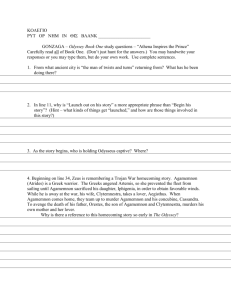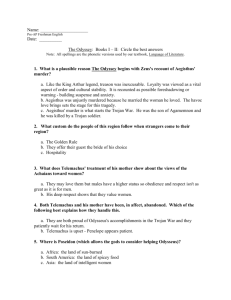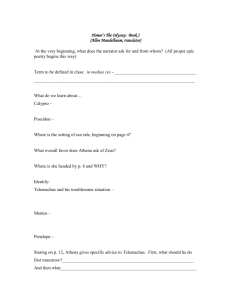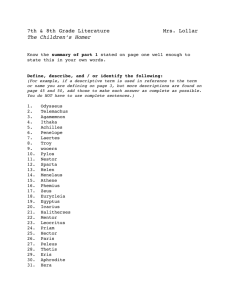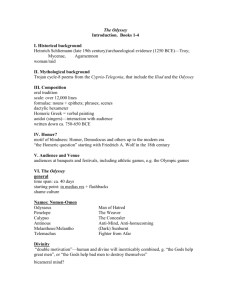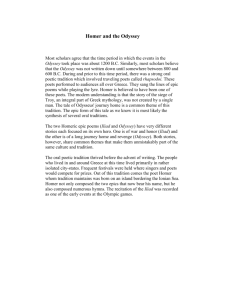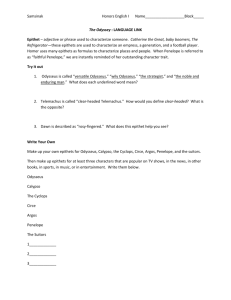The Odyssey - Kelly Buonauro
advertisement
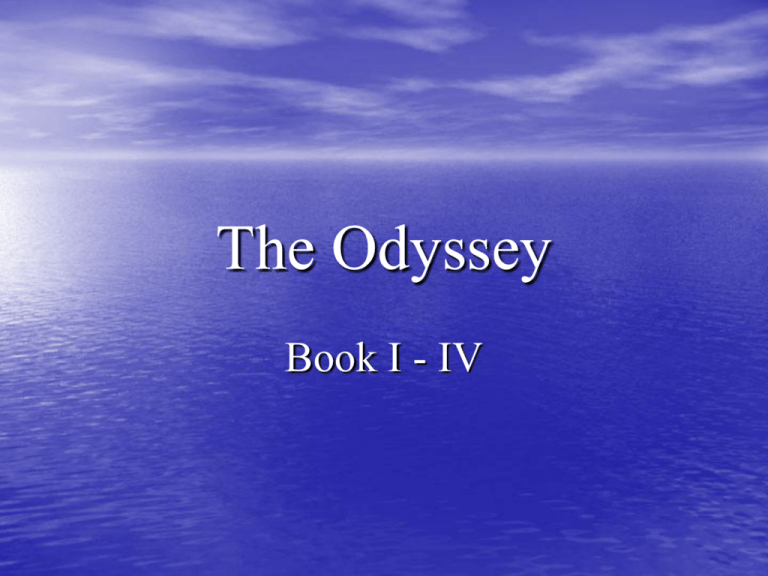
The Odyssey Book I - IV BOOK I • What is the purpose of the first ten lines of the poem? The first ten lines of the poem are an invocation to the muse of epic poetry. Homer pretends that the muse is speaking through him, and asks that his memory remain accurate. BOOK I • Why had Odysseus not yet return home from the Trojan war? He had angered the god Poseidon by blinding Poseidon's son, Polyphemos. Poseidon has placed obstacles in his way and Odysseus has not yet been able to return home. BOOK I • What does Athena do during a meeting on Mount Olympus? During Poseidon's absence, she asks Zeus to let Odysseus return home. She suggests that Hermes be sent to tell Calypso to release Odysseus. She will go to Ithaca and talk to Odysseus' son, Telemachus, and tell him where to go to find out information about his father. Zeus agrees. BOOK I • At Odysseus' house in Ithaca, we are introduced to the suitors. What are they doing in the house? They are waiting for Penelope to make up her mind which one of them she will marry. While waiting, they are eating and drinking all of the food in the house. BOOK I • What words are used to describe the suitors? Words like lusty, arrogant, young bloods, and gluttons are used. BOOK I • How does Athena present herself to Telemachus? She comes to his home disguised as Mentes, and old friend of his father. BOOK I • Athena tells Telemachus to seek information about his father Odysseus from which men? He should seek information from Nestor in Pylos and Menelaus in Sparta. BOOK I • Athena gives Telemachus one piece of information about his father. What is it? She tells him that Odysseus is not dead, but is detained somewhere on the seas. She says Odysseus can and will do anything to get home. BOOK I • To whom does Athena refer when she says: They all would find death was quick, and marriage a painful matter? She refers to the suitors. BOOK I • What does Athena counsel Telemachus to do to the suitors? She suggests killing them either openly or by treachery. BOOK I • How has Telemachus changed since the beginning of Book 1, and how does Penelope react? He has become more assertive, referring to himself as the man of the house. She looks at him in wonder. BOOK II • Why does Telemachus call the men to assembly? He wants to publicly address the problem of the suitors. They are literally eating and drinking him out of house and home. (There is a strict ritual of guest and host in The Odyssey. A guest, especially a stranger, brings news and praise to a house and a host receives a guest with offers of refreshment and gifts. The suitors are disrespectful of the relationship between host and guests, at least in Odysseus' house, and this has angered the gods. The Greek gods were said to sometimes show up as beggars at a house to test the hospitality of a man. Thus the suitors have broken the rule of hospitality in a land and time when hospitality could mean the difference between life and death. BOOK II • How has Penelope managed to hold off the suitors' demands for the past four years? She appeals to them to let her finish a death shroud for Laertes, father of Odysseus, so that when he dies she can properly wind him as is her duty (since his wife is dead). She weaves the shroud by day and then unweaves it at night to prolong having to answer to the suitors. They have been told of her deceit, and are angry at her refusal to choose a husband. Book II • What sign does Zeus send to the assembly, and what is its meaning? Zeus launches a pair of eagles who drop on the heads of the crowd (A death omen). Halitherses, who is skilled in reading birdflight, tells them it means that Odysseus is alive and will return soon. When he does, the suitors will be killed. BOOK II • What does Telemachus plan to do now? Telemachus plans to take a ship and twenty men and sail to Sparta and Pylos in search of news of his father. He keeps this news secret until time for his departure. Then Athena causes the suitors to fall into a deep sleep, and sends a good wind to start Telemachus on his journey. BOOK III • NOTICE when Nestor is telling Telemachus what he knows of the return of the Achaeans (Greeks) he describes a quarrel between "the two sons of Aretus." These are Agamemnon and Menelaus. The quarrel had to do with some sacrifice to the gods which was evidently not satisfactory, causing Athena to get mad and causing some of the Achaeans to have troublesome homecomings. Notice Agamemnon is also called Atreides (line 193). Nestor also makes clear to 26 Telemachus that a son's duty is to preserve the honor of a father's house. He also holds up the example of Orestes as has Athena. BOOK III • Where does the action in Book III take place? The action takes place at Pylos, Telemachus' first stop on his search for information about his father. BOOK III • Where is Athena during this part of the story? She has accompanied Telemachus on his journey, in the disguise of Mentor. When Telemachus makes preparations to spend the night in Nestor's palace, she changes to a vulture and flies away. Nestor interprets this as a sign of her favor for Telemachus, and prepares a sacrificial offering to her. BOOK III • Describe Nestor. Nestor is an old friend of Odysseus' who also fought in the Trojan war. He offers food and drink to Telemachus and his men, even before asking their names. Nestor then tells stories about Agamemnon and Menelaus. BOOK III • What happens at the homecoming of Agamemnon? He is murdered by his wife, Clytemnestra , and her lover, Aegisthus. BOOK III • What does Orestes do? He avenges his father's death. "Orestes killed the snake who killed his father. He gave his hateful mother and soft man a tomb together, and proclaimed the funeral day a festival day for all the Argive people." BOOK III • NOTICE (lines 309-310) Clytaimnestra has been killed, yet her death is not described. Nor is Elektra (sister of Orestes) ever mentioned. Who, according to myth, encouraged Orestes to commit the murders. BOOK III • How does Nestor help Telemachus? Nestor gives Telemachus a cart and a team of horses to take him on his inland journey. BOOK III • Who accompanies Telemachus to Sparta to the house of Menelaus? Peisistratos, son of Nestor, does. BOOK IV • What is the setting of Book IV? The setting is the home of Menelaus in Sparta. BOOK IV • How is Telemachus' identity revealed to Menelaus? Menelaus, unaware of the identity of his visitors, speaks of his grief and losses during and after the Trojan War. When he mentions Odysseus, Telemachus begins to weep. Helen, the wife of Menelaus, enters the room and recognizes Telemachus immediately, even though she has never met him. Apparently, Telemachus's resemblance to Odysseus is quite striking, and he is easily recognizable to those who knew Odysseus. BOOK IV • Menelaus describes his stay in Egypt to Telemachus. During his stay there, who told Menelaus where Odysseus was detained? Proteus, the Old Man of the Sea, did. BOOK IV • Why is Menelaus to go to the Elysian Field instead of dying as other mortals do? He is the husband of Helen, and son-in-law of Zeus, and he will not die. BOOK IV • According to Menelaus' informant, where was Odysseus? He was being detained on an island by the nymph Calypso. BOOK IV • The scene shifts to the home of Odysseus. What plan do the suitors devise against Telemachus? They put a ship in the harbor in order to ambush and kill him when he returns. BOOK IV • Identify the leading men of the suitors. They are Antinous and Eurymachus. BOOK IV • Who comforts Penelope after she learns of the suitors' plan and the journey of Telemachus? Athena disguised as Penelope's sister Ipthime, comes to Penelope in a dream and calms her fears about Telemachus. However, she will not allay Penelope's fears about Odysseus.
